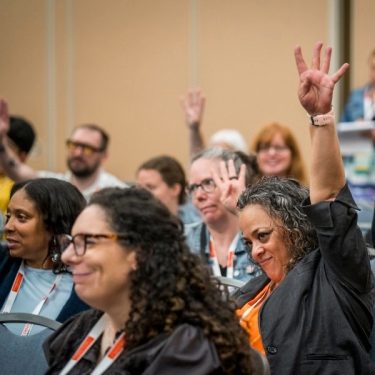VIP Community Services President and CEO Debbian Fletcher-Blake knew her organization made the right call to offer Mental Health First Aid (MHFA) training to her entire staff this year, when she heard that the course helped a human resources employee support a colleague.
“The day after the training, the HR employee told us that she received an email from a staff member and she read that request through a completely different lens because she realized this person might be in crisis,” Fletcher-Blake said.
That one experience justified all the time and effort to organize MHFA training for staff throughout the organization, said Alison Maling, VIP’s assistant vice president for Certified Community Behavioral Health Clinics.
“It changed the way she addressed the issue with that employee. That was evidence to me that it was important for everyone on staff to receive Mental Health First Aid training, not just our colleagues providing mental health care,” Maling said. “When you do this training right, it has a positive impact on people at work and in the community when they leave work.”
VIP Community Services, a National Council member in the Bronx, is one of a growing number of organizations providing MHFA training to its employees. VIP has trained 335 members of its staff of 550 so far this year, and MHFA training is now part of the onboarding process for new hires.
“There has to be a unifying theme around what we do. What more unifying theme is there for a behavioral health organization than taking care of one another? We can do that by providing Mental Health First Aid training for our entire staff. It helps us in our work as we take care of member of our community, and it helps us take care of one another,” Fletcher-Blake said. “We all need to speak with the same voice to clients, patients, residents and stakeholders to illustrate our duty of care obligations. That is, I need everyone to understand that VIP cares deeply for our community and employee wellbeing.”
That belief is shared by other leaders in the field.
Christine Stoner-Mertz, CEO of the California Alliance of Child and Family Services, introduced MHFA training while she was the president and CEO at Lincoln Families, a National Council member in Oakland, California.
“We saw it as a way not just to improve the way staff engaged with one another, but the way we engaged with the community. Especially for those members of the staff who weren’t providing traditional mental health care, it gave them the base knowledge to identify and respond to a mental health crisis. It’s good for everyone to have those tools,” Stoner-Mertz said.
Wendy Wang, chief of public policy and advocacy at Hathaway-Sycamores, a National Council member based in Pasadena, California, and the largest children’s mental health services organization in Los Angeles County, said MHFA training for behavioral health providers has other benefits, too.
“One of the strongest ways to eliminate stigma is to teach people in the community and across all industries the tools that Mental Health First Aid provides,” said Wang, who has helped teach 19 MHFA courses over the past three years. “The [MHFA Action Plan (ALGEE)] steps it teaches are applicable in a work setting and more broadly in your community. Everyone should know the principles of kindness, compassion and respect that are weaved into MHFA. Everyone should have that basic, fundamental knowledge.”
There is also a growing support for employees in all industries to provide mental health resources.
The APA’s 2023 Work in America Survey confirmed that psychological wellbeing is a high priority for workers:
- 92% of workers said it is very important to them to work for an organization that values their emotional and psychological wellbeing.
- 92% said it is very important to them to work for an organization that provides support for employee mental health.
The Society for Human Resource Management (SHRM) reported that 4 in 10 employees say their job negatively impacts their mental health, according to research from Gallup and Workhuman, and over half of employees (52%) reported feeling burned out because of their job, according to a poll from the National Alliance on Mental Illness and Ipsos.
SHRM described the challenge this way: “Failure to address these challenges risks reduced productivity, higher turnover and long-term financial repercussions. Yet many traditional workplace approaches that focus on reactive support for mental health issues fall short in fostering true resilience. Instead, organizations must equip employees with the personal and professional skills they need to navigate mental health challenges. Through a skills-based approach, leaders can cultivate a resilient workforce, enhance employee wellbeing and sustain business success.”
The National Council encourages everyone in our field to become trained in MHFA. Courses are available across the country. Visit these webpages to find a course near you or learn more about becoming a MHFA Instructor.




